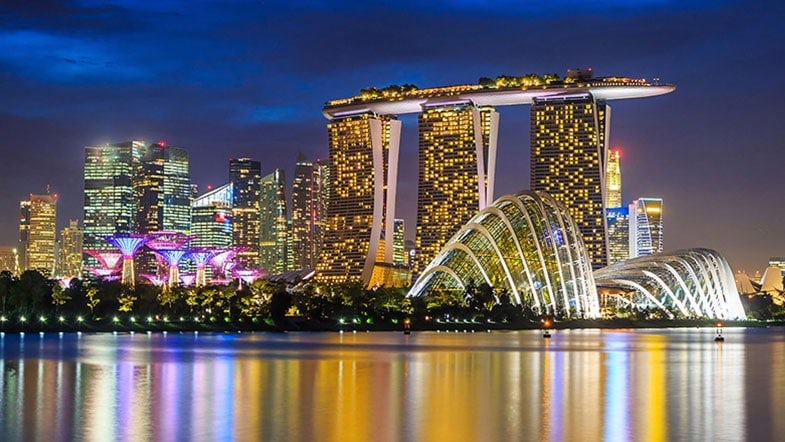G-P’s employer of record (EOR) model allows your company to start hiring talent in minutes via our global entity infrastructure. Unlike a Professional Employer Organization (PEO), G-P allows your company to expand your global footprint without the hassle of entity setup and management.
Our global employment products are backed by the largest team of HR and legal experts in the industry. We handle the growing complexities of compliant global expansion — so you can focus on opportunities ahead.
As a global EOR expert, we manage payroll, employment contract best practices, statutory and market norm benefits, employee expenses, as well as severance and termination. You’ll have peace of mind knowing you have a team of dedicated employment experts assisting with every hire. G-P allows you to harness the talent of the brightest people in 180+ countries around the world, quickly and easily.
Employment contracts in Singapore
While not a statutory requirement, it is best practice to utilize written employment contracts in Singapore to avoid ambiguity regarding essential terms of employment, such as the employee’s compensation, benefits, and termination requirements. An offer letter and employment contract in Singapore should always state the salary and any compensation amounts in Singapore dollars.
This information is provided as generally accepted information and is not intended as advisory services.
Working hours in Singapore
The Employment Act 1968 (Employment Act) is Singapore’s primary employment legislation that prescribes the basic terms and working conditions for all types of employees (including part-time, contract, and temporary employees). The Employment Act applies to both Singaporeans and international workers in Singapore.
Certain sections of the Employment Act, such as those relating to work hours and rest days, do not apply to employees in a managerial or an executive position, and only apply to “workmen” (e.g. employees who perform manual labor) earning less than SGD 4,500 a month as well as all other employees earning less than SGD 2,600 a month.
For workmen, working hours should not exceed 44 per week.
Workmen may be entitled to overtime at a rate of 1.5 times their usual wage.
Holidays in Singapore
11 days of public holidays are celebrated in Singapore.
- New Year’s Day
- Chinese New Year (2 days)
- Good Friday
- Hari Raya Puasa
- Labour Day
- Vesak Day
- Hari Raya Haji
- National Day
- Deepavali
- Christmas Day
Vacation days in Singapore
Employees who are covered by the Employment Act will be entitled to annual leave once they have worked for their employer for a period of no less than 3 months. This entitlement to annual leave depends on the duration of service, calculated from the day they commence employment for their employer, as follows:
- 1 year of service – 7 days of annual leave
- 2 years of service – 8 days of annual leave
- 3 years of service – 9 days of annual leave
- 4 years of service – 10 days of annual leave
- 5 years of service – 11 days of annual leave
- 6 years of service – 12 days of annual leave
- 7 years of service – 13 days of annual leave
- 8 or more years of service – 14 days of annual leave
It is common for all employees to be offered 14 days of annual leave, although senior executives may be offered more (18-25 days). A probation period will not impact the employee’s entitlements. For example, an employee covered by the Employment Act will accrue annual leave after 3 months, regardless of the length of their probation period (if applicable).
Singapore sick leave
Employees who are covered by the Employment Act are entitled to sick leave if:
- They have worked for the employer for at least 3 months.
- They have informed their employer within 48 hours of their absence.
- Their sick leave is certified by a medical practitioner registered under the Medical Registration Act or Dental Registration Act.
The number of days of paid sick leave is dependent on the length of service. Employees who have worked for at least 6 months are eligible for 14 days of outpatient, non-hospitalization leave and 60 days of hospitalization leave, which includes the 14 days of outpatient leave.
Employees with less than 6 months of service are entitled to paid sick leave on the following schedule:

Maternity/paternity leave in Singapore
A pregnant employee is entitled to 16 weeks of paid maternity leave if:
- The child is a Singapore citizen.
- The employee has worked for the employer for at least 3 months.
- The employee has provided the employer with at least 1 week’s notice prior to going on maternity leave.
For the first two pregnancies, the employer pays for the first 8 weeks of leave and the government pays for the remaining 8 weeks. The government pays for the entire leave for additional pregnancies.
Employees with less than 3 months of service are not entitled to paid maternity leave.
A father is generally eligible for 4 weeks of paid paternity leave, funded by the government, if:
- The employee is or was legally married to the child’s mother between conception and birth.
- The child is a citizen of Singapore.
- The employee has been employed for a continuous period of at least 3 months before the birth.
Paternity pay is capped at SGD 2,500 per week.
Mothers of adopted children are entitled to 12 weeks of paid adoption leave. Employers are eligible for government reimbursement after the first 4 weeks of adoption leave for the first 2 adopted children. For each subsequent adopted child, employers are eligible for reimbursement for the full 12 weeks.
Health insurance in Singapore
Basic insurance is provided through the national system. However, supplementary health insurance may be provided to the employee as a supplementary benefit.
Singapore supplementary benefits
Most executives request supplementary health and life insurance, but a small company may provide an allowance in lieu of arranging insurance.
Stock options are often requested by executives working for technology companies in Singapore.
Generally, we recommend budgeting 20% for benefits on top of the gross salary to allocate the total employer’s cost including benefits in Singapore, including the Central Provident Fund (CPF) allocation.
Retirement in Singapore
Singapore has a mandatory minimum retirement age of 63, at which time employers must offer employees re-employment up to the age of 68, as long as the employee:
- Has worked for at least 2 years before turning 63.
- Is a citizen or permanent resident of Singapore.
- Can satisfactorily perform the work.
- Is medically fit to continue working.
Bonuses
A 13th-month or annual bonus is not required but is market norm in Singapore. A commission plan may replace this for a sales employee. An annual bonus may be equal to 2-3 month’s salary when the economy is strong.
Termination/severance in Singapore
A probation period of 3-6 months may generally be agreed to in the employment contract, during which there is a shorter notice period for termination. This is not a statutory requirement.
An employment contract will generally stipulate the required notice period for termination. To ensure fairness in employment relationships, it is mandatory for the same length of notice to be required from both employee and employer, and the length of required notice must be agreed upon by the parties at the commencement of the employment relationship. It is common practice for 1 month’s termination notice to be provided. However, if the notice period is not specified in the employment contract, the following applies:

When a non-Singapore citizen employee ceases employment in Singapore, the tax authority – Inland Revenue Authority of Singapore (IRAS) – must be notified at least 1 month in advance and withhold all compensation due to the employee from the date the employer is aware of the employee’s impending cessation of employment or departure from Singapore. This process is known as tax clearance and it applies to all work pass holders.
Paying taxes in Singapore
CPF is the main nationally mandated benefit or social security expense. The amount varies, but we recommend budgeting 17% of the employee’s salary (on top of the regular salary) as a benefit cost to be paid into the Central Providence Fund by the employer. CPF is similar to a retirement fund.
Why G-P?
At G-P, we help companies unlock the power of the everywhere workforce through our industry-leading Global Growth Platform™. Let us handle the complex and costly tasks involved in finding, hiring, onboarding, and paying your team members, anywhere in the world, with the speed and guaranteed global compliance your business needs.
Contact us today to learn more.









